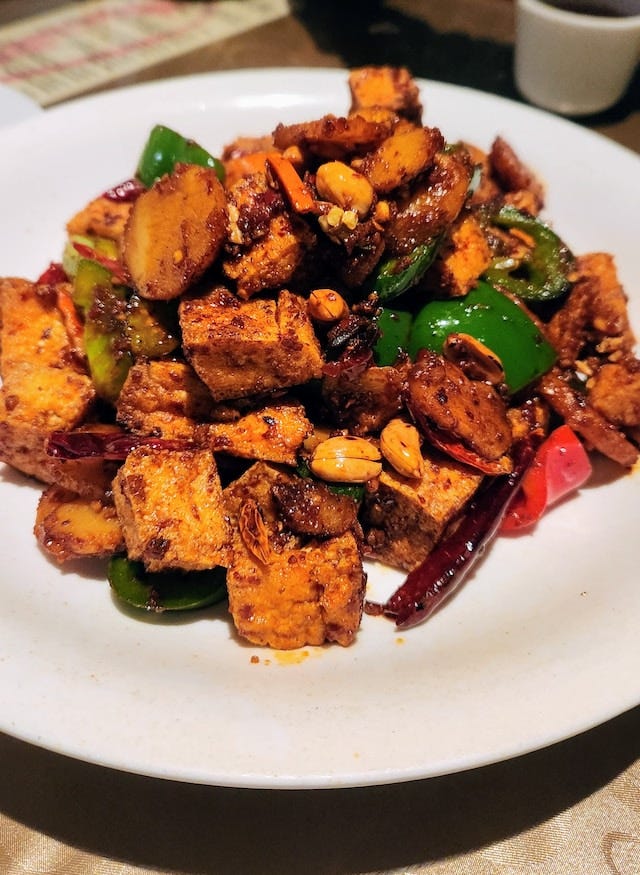African-Americans could fare well with vegetarianism
Meatless Monday or everyday, here's why the health perks matter so much

Editor’s note: The following interview was originally written and published in the Chicago Defender by Shamontiel L. Vaughn on September 2, 2008. While the link works, Shamontiel’s byline was removed after an online conversion. Click here to read more posts by Shamontiel from the Chicago Defender.
African-Americans are more likely to be overweight, and have chronic and heart diseases due to lack of healthy eating and embracing foods with lots of grease, fat and salt. However, with a vegetarian diet, some of African-Americans’ health issues may decrease.
There are those who are skeptical about the diet of a vegetarian, someone who primarily eats fruit, vegetables, whole grains, nuts, seeds and dairy products. Variations of the vegetarian diet include pescatarians, who also eat seafood; and vegans, who will not eat or wear any animal products whatsoever. In place of the protein in meat (i.e., beef, pork, chicken and fish), vegetarians often take multivitamins or B12 vitamins and consume soy “meat,” tofu or dried beans daily.

“What (vegetarians) are integrating into their diet are the things we lack the most,” said Roniece Weaver, dietician and founding partner of Hebni Nutrition Consultants, Inc.; developer of the original Soul Food Pyramid; and co-author of four nutrition books “The New Soul Food Cookbook for People with Diabetes,” “Slim Down Sister,” “Month of Meals” and “The Family Style Soul Food Diabetes Cookbook.”
Weaver continued, “Besides physical activity, we lack consumption of fresh fruits and vegetables by a far stretch. We do eat collard greens. That’s the Black man’s vegetable, but by the time we put all the grease in it, we have ruined the validity of eating vegetables. There’s nothing wrong with soul food, it’s just how we prepare it. If we took an approach to eating more fruits and vegetables in African-Americans’ diets, we’d see a huge drop in weight and a huge improvement in diabetes.”
Recommended Read: “Whether 22 days or two, veganism continues to make an impact ~ Celebs pique the interest of African-American aspiring vegans and vegetarians”
Almost 80% of African-American women, 67% of African-American men and 20 percent of African-American teenagers (ages 12-19) are overweight or obese, but with a vegetarian diet, this percentage could decrease.
According to Diabetes.org, “approximately 2.7 million or 11.4 percent of all African-Americans aged 20 years or older have diabetes,” and one third don’t know they have it. Heart disease and stroke walk hand in hand with diabetes, and excessive weight gain is one of the factors in Type 2 diabetes.
However, becoming a vegetarian does not guarantee a slim figure. Inez Teemer, a member of the Black Vegetarian Society of Illinois, lost several inches and 50 pounds after becoming a vegetarian.
“I lost more inches,” said Teemer. “I have more energy. My thing was sweet potato pies, cakes, cookies. In the wintertime, things are a little more laidback. Even if you do vegan, there are still a lot of starches in (food). That was another avenue that I had to change.”
Recommended Read: “For the ‘Love’ of Chicago: Restaurateur feeds homeless ~ Black-owned Chicago restaurant fights for social change, healthy meals”
ADVERTISEMENT ~ Amazon
As an Amazon affiliate, I earn a percentage from each product purchased using my referral link.
Fabiola Gaines, the co-author who collaborated with Weaver and chief clinical dietician for DePugh Nursing Center in Florida, backpacks on the idea that a slim waist doesn’t just come from excluding meat.
“You do see obese vegetarians,” she said. “All vegetarians are not a size ten. The importance is determining what types of foods you’ll eat to maintain vegetarianism and making sure you get the proper protein because protein repairs and builds body tissue. You can get that with soy products.”
Recommended Read: “The best time to try egg substitutes is now ~ Post-COVID, egg prices get higher and Dollar Tree stops selling them”
Numerous studies have linked soy products with lowering the rate of breast cancer among Blacks. African-American women are 36% more likely to die from breast cancer than white women, although slightly less likely to be diagnosed with it, according to a 2004 MedicalNewsToday.com article.
MensNewsDaily.com states that African-American men are three times more likely to die from breast cancer than white men. Besides not eating healthy, lack of health insurance, not being diagnosed in time to raise questions or not getting annual mammograms play a large part in these breast cancer statistics as well.
Soy may act as antioxidants and have other beneficial effects in blood vessels and the heart. Heart disease, stroke, high blood pressure, congestive heart failure and angina are some of the top ten issues that African-Americans face as leading causes of death.

But even with the perks of soy, for a meat eater, it may still be a challenge to try new foods and get used to different tastes. Chicago soul food restaurants are helping to make that change a little easier. Eateries like Quench! and Vegetarian Life make soul food meals by using tofu soy “meat,” dried beans and peanuts.
Karyn’s, one of the longest standing raw vegan food restaurants in Chicago, is also a favorite.
“I’ve visited Karyn’s, and coming from a true meat lover, I love it!” said Rita Lewis. “Her food is excellent.”
“To my dismay, I ventured over to Karyn’s for a much talked about cup of veggie chili, and lord and behold, it was excellent,” agreed Ariq Cabbler. “Two thumbs up for turning a Texas chilian around to the veggie world.”
The grocery bill for a vegetarian may be more expensive though, especially considering the primary foods that are eaten must be fresh.
Teemer said, “The hardest part (about being a vegetarian) is being accessible to getting the food or nutrients we need because it’s not like living in Florida, where, from what I’m told, there are Farmer’s Markets all year round. Here we’re dealing with conventionally growing food…and depending on where you live or where you shop, it’s not necessarily all that fresh.”
For the vegetarian on the go, certain grocery stores are catering to vegetarian frozen foods like Amy’s Kitchen, Morningstar Farms, LightLife and Quorn, as well as fluids like soy milk at Dominick’s and Jewel.
According to SoyNutrition.com, about 75% of African-Americans are lactose intolerant. Because soy milk is made of soy beans, dairy products are not a factor.
ADVERTISEMENT ~ Amazon
As an Amazon affiliate, I earn a percentage from each product purchased using my referral link.

“If you’re lactose intolerant, people like to drink soy milk,” said Weaver. “Find soy milk with the added calcium in it because soy milk does not have calcium in it. The only problem I have with soy is some of the flavored soy drinks have added sugar in it, and it does increase the calories.”
Recommended Read: “What do vegetarians eat? Visit vegan food festivals to find out ~ My 18-year transition from omnivore to ‘accidental vegetarian’”
Before proceeding into the vegetarian diet, a physician should be contacted to make sure that person’s health is in order, as well as that of any children. A study published in the Proceedings of the National Academy of Sciences website states that the highly concentrated phytoestrogens in soy formula could weaken the immune system in babies.
Breast milk is still proven to be the best and first choice for new mothers regardless of being vegetarians or not.
“I’d highly recommend women to breastfeed because your milk is safe for your infant, and breastfed babies do a lot better,” said Gaines. “When it comes to soy curing breast cancer or reducing hot flashes, studies are still out on those concepts.”
Weaver has a different perspective on the reaction to soy milk.
“I’ve had several women say that it relieves them of the flashes,” said Weaver. “They don’t sweat as much.”

For someone who is just trying to improve their health and considering the vegetarian diet, dieticians agree to start off slow instead of going cold turkey.
“You can’t just start an (omnivore) eating vegetables,” said Gaines. “You have to set up a process with that individual. Years of them eating chicken, fish and beef and now telling you all you can eat is soy protein and vegetables, and you look at the tradition of the African-American diet, that’s going to be virtually impossible initially. But if (they) slowly reduce that portion of chicken, fish and beef, and increase the portions of vegetables that they have in a meal, slowly give them tofu recipes that taste good…once they see they don’t need as much meat, (they) can then start seeing a change.”
Recommended Read: “Diabetes myths on feet, weight loss surgery, dietary care ~ Reach In! Reach Out! Program helps Chicagoland families with diabetes education”
Teemer tried becoming a complete vegetarian without the gradual steps and fell ill.
“Your body goes through a healing crisis. You can get sick, colds, nausea, a lot of things can happen. I recommend a gradual process. It’s also a spiritual thing. It takes you to another level because you’re not putting all the toxins into your body. You’re thinking clearer … and connecting with the universe.”
Did you enjoy this post? You’re also welcome to check out my Substack columns “Black Girl In a Doggone World,” “BlackTechLogy,” “Homegrown Tales,” “I Do See Color,” “One Black Woman’s Vote” and “Window Shopping” too. Subscribe to this newsletter for the weekly posts every Wednesday.
If you’re not ready to subscribe but want to support my writing, you’re welcome to tip me for this post! I’ll buy a dark hot chocolate on you. Thanks for reading!






